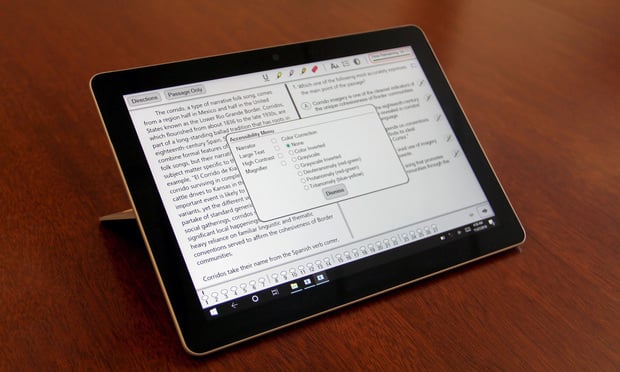At-Home LSAT Set to Debut Next Month Amid COVID-19 Pandemic
The April LSAT is canceled. But for the first time ever, aspiring lawyers will be able to take the admissions exam at home, on their own computers.
April 07, 2020 at 09:46 PM
4 minute read
 The digital version of the LSAT, which will debut in 2019, uses Microsoft Surface tablets.
The digital version of the LSAT, which will debut in 2019, uses Microsoft Surface tablets.
Aspiring law students will be able to take the Law School Admission Test at home next month.
The Law School Admission Council, which administers the LSAT, announced late Tuesday that the April 25 LSAT is canceled due to the coronavirus pandemic but that a pared-down version of the test would be available to test takers on their own computers in late May.
It's a remarkable turn of events for an admissions exam that only switched to digital delivery less than a year ago.
"We are working hard amid this crisis to create new ways for you to take the LSAT and get your score in a timely manner because we know how important it is to you and to fairness and integrity in law school admission, which advances access and equity in legal education," reads the council's statement announcing the at-home option. "We appreciate your patience and flexibility as we all work through this extraordinary situation together."
The cancellation of the April LSAT was not unexpected—the council canceled the March administration and said it would make a determination about whether it was possible to move forward with this month's test by April 10. But ongoing restrictions on travel and gatherings made giving the exam in mere weeks impossible, the council wrote.
More surprising is the council's move to deliver an at-home exam in little more than a month. The council said it was working on a remote option when it canceled the March test, but some LSAT watchers were skeptical that it would be able to roll that out quickly. (The LSAT's competitor on the law school admissions market, the GRE, began offering an at-home option last month.)
"Creating a version of the LSAT that aspiring lawyers can take from the safety of their own homes is a win for test takers, many of whom had their admissions timelines disrupted because of COVID-19-related test cancellations in April," said Jeff Thomas, the executive director of admissions programs at Kaplan Test Prep. "This makes an uncertain and stressful situation a lot more manageable."
The at-home test, dubbed LSAT-Flex, will have three 35-minute scored sections as opposed to the traditional five, which includes one unscored section. It should take about two hours to complete under the standard time allowance. Scores will still be delivered in the traditional 120 to 180 range.
The council has yet to announce the exact date of the LSAT-Flex, but said it will be given in the second half of May. The final date will be announced no later than April 17. LSAT-Flex will be "remote proctored," meaning that test takers will be monitored by the cameras and microphones in their computers and those video and audio feeds will be recorded for further review.
The May test is open to those who registered for the now-canceled April exam. Those who were slated to take the March LSAT were automatically registered for the April exam.
"We will continue to monitor the COVID-19 pandemic closely and will make other LSAT-Flex test dates available this spring and summer if the situation warrants," reads the council's announcement. "We plan to resume the in-person LSAT once conditions allow, in strict accordance with public health authorities and using all necessary health and safety measures."
Steve Schwartz, chief executive officer of test prep provider LSAT Unplugged, said that subsequent waves of the coronavirus could make it difficult to return to the in-person administration of the LSAT in the short- to medium-terms.
"Given the COVID-19 situation, I suspect there will be several LSAT-Flex administrations," he said. "And the more that there are, the more this becomes the new 'normal.'"
NOT FOR REPRINT
© 2025 ALM Global, LLC, All Rights Reserved. Request academic re-use from www.copyright.com. All other uses, submit a request to [email protected]. For more information visit Asset & Logo Licensing.
You Might Like
View All
University of New Hampshire Law School Launches Specialized Health, Life Sciences Program

Supreme Court Takes Up Case Over Approval of Religious Charter School

The Week in Data Jan. 24: A Look at Legal Industry Trends by the Numbers

Trending Stories
- 1Who Is Nicholas J. Ganjei? His Rise to Top Lawyer
- 2Delaware Supreme Court Names Civil Litigator to Serve as New Chief Disciplinary Counsel
- 3Inside Track: Why Relentless Self-Promoters Need Not Apply for GC Posts
- 4Fresh lawsuit hits Oregon city at the heart of Supreme Court ruling on homeless encampments
- 5Ex-Kline & Specter Associate Drops Lawsuit Against the Firm
Who Got The Work
J. Brugh Lower of Gibbons has entered an appearance for industrial equipment supplier Devco Corporation in a pending trademark infringement lawsuit. The suit, accusing the defendant of selling knock-off Graco products, was filed Dec. 18 in New Jersey District Court by Rivkin Radler on behalf of Graco Inc. and Graco Minnesota. The case, assigned to U.S. District Judge Zahid N. Quraishi, is 3:24-cv-11294, Graco Inc. et al v. Devco Corporation.
Who Got The Work
Rebecca Maller-Stein and Kent A. Yalowitz of Arnold & Porter Kaye Scholer have entered their appearances for Hanaco Venture Capital and its executives, Lior Prosor and David Frankel, in a pending securities lawsuit. The action, filed on Dec. 24 in New York Southern District Court by Zell, Aron & Co. on behalf of Goldeneye Advisors, accuses the defendants of negligently and fraudulently managing the plaintiff's $1 million investment. The case, assigned to U.S. District Judge Vernon S. Broderick, is 1:24-cv-09918, Goldeneye Advisors, LLC v. Hanaco Venture Capital, Ltd. et al.
Who Got The Work
Attorneys from A&O Shearman has stepped in as defense counsel for Toronto-Dominion Bank and other defendants in a pending securities class action. The suit, filed Dec. 11 in New York Southern District Court by Bleichmar Fonti & Auld, accuses the defendants of concealing the bank's 'pervasive' deficiencies in regards to its compliance with the Bank Secrecy Act and the quality of its anti-money laundering controls. The case, assigned to U.S. District Judge Arun Subramanian, is 1:24-cv-09445, Gonzalez v. The Toronto-Dominion Bank et al.
Who Got The Work
Crown Castle International, a Pennsylvania company providing shared communications infrastructure, has turned to Luke D. Wolf of Gordon Rees Scully Mansukhani to fend off a pending breach-of-contract lawsuit. The court action, filed Nov. 25 in Michigan Eastern District Court by Hooper Hathaway PC on behalf of The Town Residences LLC, accuses Crown Castle of failing to transfer approximately $30,000 in utility payments from T-Mobile in breach of a roof-top lease and assignment agreement. The case, assigned to U.S. District Judge Susan K. Declercq, is 2:24-cv-13131, The Town Residences LLC v. T-Mobile US, Inc. et al.
Who Got The Work
Wilfred P. Coronato and Daniel M. Schwartz of McCarter & English have stepped in as defense counsel to Electrolux Home Products Inc. in a pending product liability lawsuit. The court action, filed Nov. 26 in New York Eastern District Court by Poulos Lopiccolo PC and Nagel Rice LLP on behalf of David Stern, alleges that the defendant's refrigerators’ drawers and shelving repeatedly break and fall apart within months after purchase. The case, assigned to U.S. District Judge Joan M. Azrack, is 2:24-cv-08204, Stern v. Electrolux Home Products, Inc.
Featured Firms
Law Offices of Gary Martin Hays & Associates, P.C.
(470) 294-1674
Law Offices of Mark E. Salomone
(857) 444-6468
Smith & Hassler
(713) 739-1250








